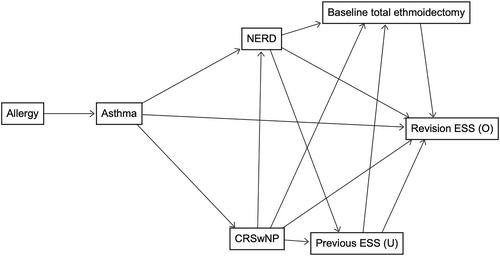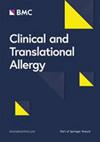Comorbidities of chronic rhinosinusitis in children and adults
Abstract
Background
Chronic rhinosinusitis (CRS) is a chronic inflammatory disease of the nose and paranasal sinuses lasting ≥12 weeks. CRS may exist with (CRSwNP) or without (CRSsNP) nasal polyps. The aim was to evaluate conditions associated with CRS in a randomized hospital cohort. We hypothesized that comorbidities and surgical procedures differ between pediatric and adult patients.
Methods
This study consisted of hospital registry data of a random sample of rhinosinusitis patients (age range 0–89 years) with the diagnosis of J32 or J33, correspondingly, registered during outpatient visits from 2005 to 2019 (n = 1461). The covariates of interest were collected from electronic health records based on ICD-10 codes and keyword searches.
Results
Among pediatric patients (n = 104), the relative proportions of CRSsNP and CRSwNP were 86% and 14% respectively. The relative proportions of adult patients (n = 1357) with CRSsNP and CRSwNP were 60% and 40%, respectively. The following comorbidities significantly differed (p < 0.05) between pediatric and adult populations: allergy, chronic otitis media, and tonsillar diseases. In total, 41 % of the children and 46% of the adults underwent baseline endoscopic sinus surgery (ESS). Additional surgeries of the ear, nose and pharynx were significantly more common among children compared with adults. Risk of revision after baseline ESS was associated (p < 0.05) with allergy, asthma, eosinophilia, CRSwNP, immunodeficiency or its suspicion, non-steroidal anti-inflammatory drug exacerbated respiratory disease, and number of any diseases ≥2.
Conclusions
Our study showed that comorbidities differ between pediatric and adult rhinosinusitis patients, as allergy, asthma and allergy, chronic otitis media, mental health disorders, and tonsils disease were significantly more prevalent among pediatric patients. Children and adults were equally treated with ESS. Notably, children underwent additional surgery on adenoids and tonsils more frequently. The effectiveness of ESS in multimorbid adults should be assessed at an individual level.


 求助内容:
求助内容: 应助结果提醒方式:
应助结果提醒方式:


